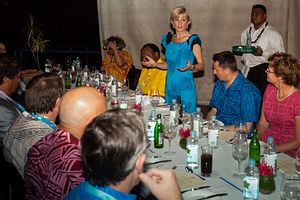This week Australia’s foreign minister, Julie Bishop, embarked on a two-day tour of the South Pacific states of Solomon Islands, Samoa, and Vanuatu. She is being joined on the trip by her colleague Senator Concetta Fierravanti-Wells, the minister of international development, as well as Labor Party Senators Penny Wong and Clare Moore in a show of bipartisan commitment to the South Pacific region.
In part the trip is designed to shore up Australia’s position as a responsible and stable force in the region, an attempt to alleviate concerns about any potential policy shifts from the forthcoming Trump administration in the United States that may undermine current norms. While these smaller states may seem distant from the machinations of the larger global actors, they still rely on the predictable actions of larger states in order to understand the global terrain and pursue their own interests within it.
Beyond discussions of regional stability there are a number of assistance packages and programs that the foreign minister will be unveiling in the countries she is visiting. In Samoa Bishop will be providing funds for emergency infrastructure, contributing AU$1.4 million (US$1.05) toward the Samoa AgriBusiness Support Project being run by the Asian Development Bank, as well as contributing further funds to family health initiatives.
With reconstruction from Tropical Cyclone Pam that hit Vanuatu in March 2015 an ongoing operation, the Australian government will be providing an extra AU$35 million (US$26 million) recovery package that will focus on longer-term capacity building measures such as education, health, reviving the country’s tourism industry and encouraging female empowerment.
Bishop’s trip to Vanuatu comes only two weeks after President Baldwin Lonsdale dissolved the Parliament and called a snap election. The legislative processes in the country had come to an impasse after 14 Members of Parliament (MPs) were jailed for bribery. The president deemed an election was the only way to break the current deadlock, with a dysfunctional Parliament that cannot pass a budget being detrimental to continuing work of restoring the country’s infrastructure after Cyclone Pam.
In the Solomon Islands Bishop will be engaged in discussions related to the scheduled withdrawal of the Regional Assistance Mission to Solomon Islands (RAMSI) in June 2017. These forces have been stationed in the Solomon Islands since July 2003, when two local militias, the Isatabu Freedom Movement and the Malaita Eagle Force, both engaged in armed conflict with the Solomon Islands government (and each other). Police and military forces from six members of the Pacific Island Forum — Australia, New Zealand, Papua New Guinea, Fiji, Tonga, and Samoa — have been deployed in the country since the unrest. Assuring a smooth transition from the RAMSI forces to the Solomon Islands police, with the prevention of further unrest, will be a key task for the foreign minister over the next six months.
Another important item of discussion for Bishop on her visit to the region will be an attempt to create a smoother process for Australia’s Seasonal Workers Program aimed at citizens of nine Pacific Island countries (and Timor-Leste), including the three countries she will be visiting. With the effects of recent changes to the Working Holiday program for young backpackers unknown, the Australian government will need to shore up a consistent stream of agricultural laborers to perform vital but low-paid field work. The Seasonal Workers Program will grow in importance as a safeguard just in case numbers for the Working Holiday program diminish.
This will please many of the Pacific Island states, which have been pushing for greater access to the labor markets of Australia and New Zealand. These states would no doubt see the new disincentives within the Working Holiday program as an opportunity for them to gain a greater foothold in the Australian agricultural sector for their citizens. The remittances that Pacific Islanders send back to their respective countries, as well as the skills they develop while working and living in Australia, are an essential component of these countries’ development.
Although this is just a brief two day tour of three South Pacific countries, such visits are reasonably frequent by high-level Australian officials. As the South Pacific is part of Australia’s natural sphere of influence the country sees it being in its interests to help facilitate both stability and prosperity in the region. While the current Fijian government may disagree, Australia is deemed a fairly benevolent actor in the region. The foreign minister’s visit this week should consolidate Australia’s commitment to friendly and cooperative relations within the South Pacific.

































